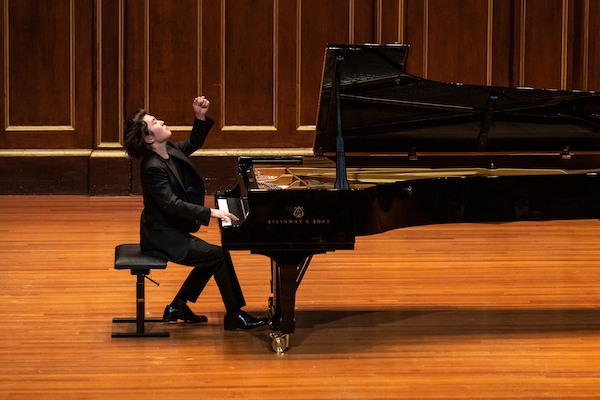Concert Review: Pianist Seong-Jin Cho — Fire and Precision
By Aaron Keebaugh
The South Korean pianist possesses technique to burn. His tone is pearly and deep, capable of both haunting distance and grandeur.

Pianist Seong-Jin Cho at Jordan Hall. Photo: Robert Torres
From its opening gallantries to concluding emotional splendors, Brahms’s Handel Variations call for a pianist to play with a keen awareness of what is coming around every corner.
But few can reveal the work’s surprises quite like Seong-Jin Cho, who made the variations the centerpiece of his Celebrity Series recital Sunday at Jordan Hall. Playing with elegance and power, Cho made it abundantly clear why he is one of the most celebrated young artists on the scene today.
The South Korean pianist possesses technique to burn. His tone is pearly and deep, capable of both haunting distance and grandeur.
Both elements made Brahms’s Op. 24 into a display of passion, angst, and ultimate resolution. Cho’s soft pedal let the trills and mordents of the Aria mingle in a tasteful blur. His gentle tone tipped the first few variations toward light. The first frolicked, the second shimmered via his undulating harmonies.
As the music progressed, Cho generated seismic urgency. A weightier touch let the syncopations of the fourth variation resound with outsize force. He leaned into the demonic 10th with Lisztian bravura.
Other movements didn’t dance so much as turn affectingly from moment to moment. The 11th variation was coolly introspective; the 17th flowed gingerly. But the later variations and fugue culminated in frenetic, finger-twisting energy.
That balance — between classical restraint and romantic fervor — led Robert Schumann to deem Brahms the legitimate heir to Beethoven. But Schumann had previously lavished praise on another promising youth, the English composer William Sterndale Bennett, to whom Schumann dedicated his Symphonic Etudes, Op. 13.
Cho’s performance of this little-programmed score also eschewed poetic grace in favor of raw emotional power. He tapped the funereal depths of the opening theme and softened his tone for the first etude’s impish delicacies.
There were humorous moments along the way. The fourth etude tittered, while the left-hand figures of the fifth guffawed in wild abandon. Cho nimbly seesawed between tension and repose in the posthumous variations.
Cho’s affinity for pushing and pulling the tempo also revealed episodes of uncommon earnestness in this music. The eighth etude brooded; the 10th coursed with soulful purpose. Cho’s crash-and-bang fervor made the finale bound with regal pomp.
Selections from Brahms’s Klavierstücke, Op. 76 were also essays in romantic extremes. Cho’s wide dynamic shading made the Capriccio in F-sharp minor surge in waves. The Intermezzo in B-flat major was suitably yearning because of his generous rubato. The pianist reveled in the piece’s drama as well, the gleeful grotesqueries of the Capriccio in B minor matching the raw vigor that throbs throughout the C-sharp minor.
In two suites by Handel, on the other hand, the pianist basked in the moment. Swift flourishes made the opening to the Suite No. 2 in F major sound spacious. The ensuing Allegro danced and the lines of the Adagio flowered in a duet between hands. The fugue was nurtured for lyrical delights as Cho carefully caressed every theme.
This was a thinker’s Handel, with dynamics bringing dimension to every rising and falling line. The Prelude of the Suite No. 8 in F minor was dark and mercurial, the Allegro bold and resolute. While the dances never lacked for grace, Cho’s lyricism made this a performance to savor.
Two encores delivered that same combination of elegance and power. Wilhelm Kempff’s arrangement of Handel’s Minuet in G minor lilted. But Chopin’s “Heroic” Polonaise showcased Cho’s greatest strengths as a performer — fire and precision intertwined.
Aaron Keebaugh has been a classical music critic in Boston since 2012. His work has been featured in the Musical Times, Corymbus, Boston Classical Review, Early Music America, and BBC Radio 3. A musicologist, he teaches at North Shore Community College in both Danvers and Lynn.
